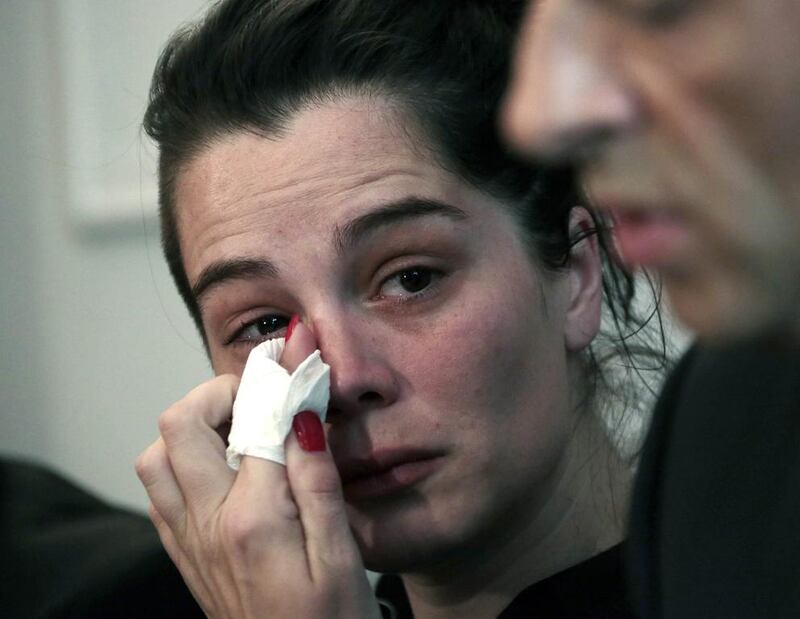NICE, FRANCE // To many French people fed up with crime and the apparent powerlessness of police and politicians to prevent it, Stephan Turk, a Lebanese-born jeweller who shot and killed a fleeing armed robber, is a hero.
But to the family of the dead man, Anthony Asli, 19, a repeat offender, he is nothing but a murderer. “My son was shot like a pigeon,” said Asli’s father.
The law, for now, is on the family’s side.
Mr Turk, 67, is under investigation — a step close to being formally charged — for voluntary homicide.
Asli and an accomplice, who is still sought by police, burst into the shop, La Turquoise, in the centre of the French Riviera resort of Nice, as Mr Turk prepared to open for business on Wednesday last week. They beat and kicked him, threatening him with a pump-action shotgun and forcing him to hand over jewellery before climbing on to their stolen scooter.
Mr Turk, who does not have a firearms licence, grabbed an automatic pistol and advanced towards the entrance to his shop. He fired three shots, one of which killed Asli.
The Nice public prosecutor, Eric Bedos, said the jeweller squatted before shooting. “He says he fired twice to immobilise the scooter, a third time when he felt himself threatened,” he said. “It is my belief he shot with the intention of causing death. When he fired, his life was no longer in danger.”
Despite this interpretation, there has been an extraordinary groundswell of support and sympathy for Mr Turk inside France and beyond. His shop had been the target of previous robberies.
By yesterday, a Facebook page declaring support for him had received more than 1.65 million “likes”.
The origins of the page remain unknown, and the French media have highlighted suspicion that the figures may have been manipulated.
Yet there is no doubt that the jeweller has become, for some, a powerful symbol of the frustration and despair felt by those who feel hard work and honesty are valued less and less, and criminals treated with undue leniency, in modern French society. France and even senior government ministers are divided by current plans to make more use of probation to tackle prison overcrowding.
The far-right, populist Front National (FN) has seized on the controversy to present itself as the party that cares most about the security of ordinary people.
“I would have done the same as the jeweller, and it won’t surprise you to hear me say it,” said Jean-Marie Le Pen, the FN’s founder and former president. His daughter, Marine, the present leader, was more cautious. Mr Turk “did not act in legitimate self-defence, judicially speaking”, she said, but his reaction was “emotionally legitimate”.
The shooting has raised yet again the question, debated the world over, of what represents reasonable self-defence.
Asli’s family say he was carrying only a fake weapon and was not a man of violence, neither of which would have been known to the jeweller.
“I am sorry he is dead,” Mr Turk said after being released on bail with an electronic surveillance bracelet and placed under house arrest at an undisclosed residence in another area. “But he decided to do what he did and I was entitled to defend myself.” However, he was adamant later in a press conference that he never intended to shoot the robber: “I wanted to stop the scooter, that’s all. I never wanted to hit anyone.”
Among those who have posted comments online, support for the jeweller ranges from sympathy falling short of approval of “the law of the Wild West” to regret that he did not kill both robbers.
France’s socialist president, Francois Hollande, said on the TF1 channel he understood the “anger and exasperation” of victims of crime. At 19, the robber had 14 past convictions, he said before adding: “It’s up to the justice system to deliver justice, and no one else”.
Up to 1,000 people, including many other shopkeepers, demonstrated in the centre of Nice on Monday to show solidarity with Mr Turk.
The city’s centre-right mayor and MP, Christian Estrosi, said that when a citizen of Nice was attacked, it was his duty “to be at his side”. He described Mr Turk as an “honest, well-known and much appreciated`’ shopkeeper.
But in an interview with the local daily newspaper, Nice-Matin, the dead robber’s father, named as Pascal, said that although his son was a thief and had “done many stupid things”, he did not deserve to die as he did.
Asli’s sister, Alexandra, expressed indignation at a press conference organised by the family’s lawyers that Mr Turk had been freed and feted as a hero.
She accepted that her brother had been a delinquent but said this applied to the jeweller, too. Referring to the “indecent” demonstration, she added: “Today we take the defence of a murderer. Let him go to jail like any other offender. ”
Although few expect the full force of the law to descend on Mr Turk, he theoretically faces a life sentence unless able to prove self-defence, which lawyers consider a tall order. The mitigating factors are likely to ensure a much more lenient penalty.
Figures published by the right-wing daily newspaper, Le Figaro, suggest serious crime rose in France by 5.2 per cent in the 12 months to July 2013. The increases were sharper for burglaries (9.3 per cent) and armed robberies (8.4 per cent). The Riviera has seen a spate of armed jewel robberies this year, including two during the Cannes film festival and the record €103 million (Dh505 million) heist in the same resort in July.







